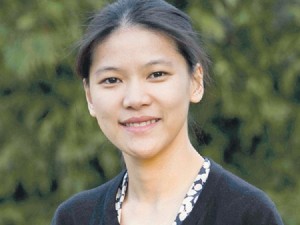Journey to the stars and back
Is the world ending in 2012? What happens if you get sucked in a black hole? Do you believe in evolution? Are there other planets like Earth?
Judging from the questions thrown last month by freshman and sophomore students of San Juan National High School to Dr. Reinabelle Reyes, an astrophysicist based in Chicago, student interest in science is white-hot.
Reyes, 27, graduated with a degree in physics at the Ateneo de Manila University then went on to earn her PhD at Princeton University. She is currently doing her postdoctoral work at the Kavli Institute for Cosmological Physics, University of Chicago.
Reyes received the Chambliss Astronomy Achievement Student Award for her role in the discovery of the largest number of “obscured quasars,” which are super massive black holes in the centers of galaxies.
At present, Reyes is part of a team that is studying dark energy, one of the deepest mysteries of the galaxy.
Her parents said Reinabelle showed an interest in science and the natural world at a very young age. “It’s her passion,” her mother Botan said.
On a short break from her university work, Reyes has been talking to high school and college students in Manila to discuss the universe and physics in general. Questions from students ranged from the death of dinosaurs to the significance of astrology and the date for the apocalypse.
Reyes said she is heartened by the students’ curiosity and interest in science, describing it as “very high.” “I want to reach out to people. You get a sense of interest from them,” she said.
She answered their questions with patience and in simple terms. She clarified misconceptions (the significance of zodiac signs, the world ending this year) with candor, telling students that the universe would definitely not end in 2012. “There are still a lot of things you can do,” she said.
Reyes said teachers and parents should encourage questions from students. “When you’re very young, you get strange ideas that are actually real. That’s part of science, the discussion, the asking,” she said.
When asked about plans to change science education in the Philippines, Reyes was careful to say she was not entirely versed about it. However, she stressed that educators should initiate with students back-and-forth discussions and experiments rather than rote memorization.
“There’s a lot of memorization, the idea that what the teacher says is right. But science is not like that. It is a work in progress. It is done by asking questions, by doing experiments,” Reyes said.
Telling students to memorize the names of the planets may be easy, but that knowledge is disposable, said Reyes. Basic experimentation is more valuable for her. She recalled her early experiments with seedlings that illustrated photosynthesis, the process in which plants process light energy into chemical energy. Because there was a visible, measurable result, photosynthesis became an easy-to-understand and hard-to-forget biological process. “It stuck in my mind,” Reyes said.
After her three years as a postdoctoral fellow, Reyes said she plans to come home and teach physics.
The goal, she said, is to make science more accessible to Filipinos.
